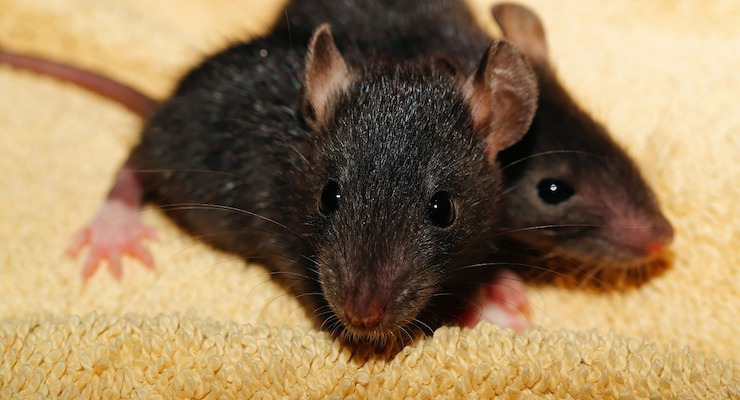Dalla memoria dei ratti, un’arma contro l’Alzheimer / From the memory of rats, a weapon against Alzheimer's
Dalla memoria dei ratti, un’arma contro l’Alzheimer / From the memory of rats, a weapon against Alzheimer's
Segnalato dal Dott. Giuseppe Cotellessa / Reported by Dr. Giuseppe Cotellessa

Anche i ratti sono in grado di ripercorrere con la mente nel giusto ordine i loro ricordi, come dimostra un team di neuroscienziati dell’Università dell’Indiana. Una scoperta che potrebbe aiutare lo sviluppo di nuovi farmaci per le malattie neurodegenerative
Cosa facciamo quando perdiamo le chiavi di casa? Ripercorriamo con i ricordi tutto quello che abbiamo fatto da quando abbiamo chiuso la porta fino a quando ci siamo accorti di averle smarrite. Questa capacità di ricordare gli eventi passati nel giusto ordine è correlata alla memoria episodica, quella che permette di ricordare episodi unici, e finora la si riteneva propria solo della specie umana.
Da tempo però si studiano gli animali per dimostrare l’esistenza di una memoria episodica anche in altre specie. Alcuni studi, in particolare, avevano formulato delle ipotesi su una memoria episodica nei cani. Il team di Jonathon D. Crystal, neuroscienziato del Dipartimento di Scienze Psicologiche e del Cervello presso l’Università dell’Indiana, ha ora dimostrato che i ratti sono in grado di ripercorrere una sequenza di ricordi grazie alla memoria episodica. “Il motivo per cui siamo interessati alla memoria animale non è solo quello di capire gli animali, ma soprattutto quello di sviluppare nuovi modelli di memoria che si adattino ai tipi di memoria compromessa, come la malattia di Alzheimer”, spiega Crystal su Current Biology.
Per svolgere la ricerca, Crystal e i suoi colleghi hanno lavorato per un anno su un gruppo di 13 ratti, addestrandoli a memorizzare fino a 12 odori. Durante la prima fase dell’esperimento i ratti sono stati messi in un’arena e premiati solo quando sono stati in grado di riconoscere gli odori nella giusta sequenza. Il team, poi, ha modificato il numero di odori nella lista prima di ogni test per confermare che l’identificazione avveniva in base alla loro posizione nell’elenco, non per il profumo. I ratti sono riusciti a riconoscere le sequenze corrette nell’87% dei test, un numero che esclude la casualità e mostra che gli animali hanno fatto affidamento alla loro memoria episodica.
Per verificare ulteriormente il risultato, Crystal e i suoi colleghi hanno svolto successivi esperimenti che hanno dimostrato che i ricordi dei ratti sono duraturi e resistenti alle interferenze di altri ricordi. L’esperimento che prevedeva l’inibizione temporanea dell’ippocampodei ratti, sito della memoria episodica, ha confermato in particolare quanto sia fondamentale questa area cerebrale per determinare il successo nel riconoscimento delle corrette sequenze di odori. Dal momento che l’ippocampo è tra le prime aree colpite dalla malattia di Alzheimer, e i ratti sono un modello importante per la sperimentazione di trattamenti per tale patologia, lo studio sulla memoria episodica di tali animali potrebbe aprire nuovi possibili scenari per il futuro della ricerca in questo campo.
ENGLISH
Even the rats are able to retrace their memories with the mind in the right order, as shown by a team of neuroscientists at the University of Indiana. A discovery that could help the development of new drugs for neurodegenerative diseases
What do we do when we lose our house keys? Let's go through the memories with everything we've done since we closed the door until we realized we had lost them. This ability to remember past events in the right order is related to episodic memory, the one that allows to remember unique episodes, and so far it was considered only one of the human species.
For some time, however, animals are studied to demonstrate the existence of an episodic memory in other species as well. Some studies, in particular, had formulated hypotheses about episodic memory in dogs. The team of Jonathon D. Crystal, a neuroscientist in the Department of Psychological Sciences and Brain Sciences at the University of Indiana, has now shown that rats are able to retrace a sequence of memories through episodic memory. "The reason why we are interested in animal memory is not only to understand animals, but above all to develop new memory models that adapt to compromised types of memory, such as Alzheimer's disease," explains Crystal on Current Biology.
To carry out the research, Crystal and her colleagues worked for a year on a group of 13 rats, training them to store up to 12 odors. During the first phase of the experiment the rats were placed in an arena and rewarded only when they were able to recognize the smells in the right sequence. The team then changed the number of odors in the list before each test to confirm that the identification occurred based on their position in the list, not for the perfume. The rats were able to recognize the correct sequences in 87% of the tests, a number that excludes randomness and shows that the animals have relied on their episodic memory.
To further verify the result, Crystal and her colleagues have done successive experiments that have shown that the memories of the rats are durable and resistant to interference from other memories. The experiment that included the temporary inhibition of the hippocampodei rats, site of the episodic memory, confirmed in particular how fundamental this area of the brain is to determine the success in the recognition of the correct sequences of odors. Since the hippocampus is among the first areas affected by Alzheimer's disease, and rats are an important model for testing treatments for this disease, the study of episodic memory of such animals could open new possible scenarios for the future of research in this field.
Da:
https://www.galileonet.it/2018/05/memoria-ratti-arma-alzheimer/



Commenti
Posta un commento